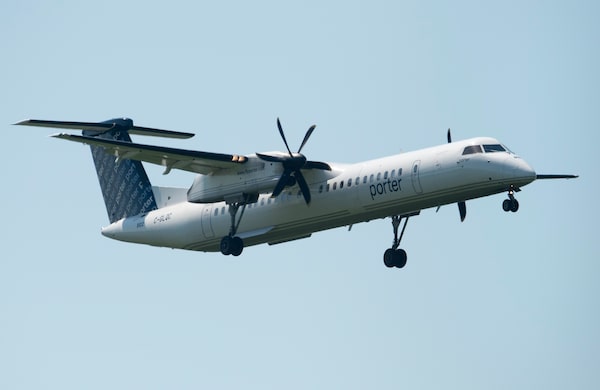
A Porter Airlines flight makes its final approach as it lands in Ottawa, on July 2, 2019.Adrian Wyld/The Canadian Press
After a gruelling two years, Air Transat and Porter Airlines have signed a code-sharing agreement they hope will draw customers to a wider range of connecting flights in Canada and abroad.
The first phase of the agreement will focus on connecting Porter’s operations at Toronto’s Billy Bishop airport and the Halifax airport to Air Transat’s hub in Montreal, the airlines say.
Expected to take effect this summer as travel demand rebounds, the code-sharing agreement will see each airline sell, under its own code, flights operated by its partner. The deal enables travellers to combine flight segments on a single ticket and check their baggage just once.
Porter Airlines chief executive Michael Deluce says the agreement complements his airline’s own growth plans, which include the addition of jets and flights out of Toronto Pearson International Airport later this year.
“The introduction of seamless access to international markets, where Air Transat has made its mark, is an especially great benefit for our passengers,” he said in a joint release.
Both airlines could use a boost.
Porter resumed flights in September for the first time since March, 2020, after grounding its fleet because of COVID-19 restrictions. The 16-year-old carrier operates flights to more than a dozen cities in Central and Eastern Canada and five U.S. destinations.
Transat AT TRZ-T, which depends on trips to sun destinations in winter and European cities in summer, lost $886-million in its past two fiscal years as the pandemic bled cash from the tour operator. Porter is a private company that doesn’t disclose its financial results.
The code-share deal also comes as Canadian carriers seek to expand their footprint after the pandemic upended the aviation sector.
Last week, WestJet Group announced an agreement to buy Sunwing Airlines and Sunwing Vacations, bolstering its presence in the holiday tour market amid rising competition. The deal is subject to reviews by the competition commissioner and Transport Canada, and final approval rests with the Transport Minister.
Several budget carriers have also been beefing up since the summer in preparation for a clash with WestJet and Air Canada AC-T – and with each other – particularly for domestic flights and sun destinations.
Flair Airlines has added more than a dozen Boeing 737s to its fleet, with plans to expand its fleet to 50 planes by 2025. WestJet subsidiary Swoop is tacking on routes, and Lynx Air is joining the fray as well, poised to make its maiden voyage April 7.
Meanwhile, Porter has ordered 30 Embraer jets with an option for 50 more, for a total value of US$5.8-billion based on list prices.
While the pandemic saw billions of dollars in industry revenue go up in smoke over the past 24 months, it also burned down barriers to entry for upstarts.
Plummeting demand for aircraft meant carriers could access them more quickly and cheaply. A pilot shortage that had plagued the industry is no longer as severe. And greater availability of airport slots has given companies leverage when striking deals with airport authorities.
Your time is valuable. Have the Top Business Headlines newsletter conveniently delivered to your inbox in the morning or evening. Sign up today.